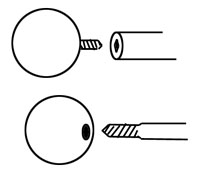|
|
| Line 1: |
Line 1: |
| [[File:HypertrophicEar.jpg|thumb|right|HypertrophicEar.jpg]] | | [[File:Threading.jpg|right|200px|Threading.jpg]] |
|
| |
|
| '''Hypertrophic scarring''' is heavy scarring that appears around a piercing or other wound. The main reason that they're different from [[Keloids|keloid]] scars is that they don't extend past the original scar. Moreover, they're generally more clear than keloids.
| | [[:Barbell|Barbells]] are attached to [[:Bead|beads]] via threaded rods. How they attach can vary. |
|
| |
|
| Most people — including many piercers — will mistakenly call all bumps keloids, when in fact hypertrophic scarring is more common.
| | There are two main kinds of '''threading''' used in the [[:Body modification|body modification]] industry. The top drawing shows an internally threaded barbell, where the bead screws into the bar. The bottom drawing shows an externally threaded barbell, where the bar screws into the bead. A subtype of external threading is step-down threading, where the threaded portion is of a smaller gauge than the main stem of the barbell - this can help prevent the threads catching on the [[:Fistula|fistula]] during insertion. |
| | |
| Hypertrophic scars go away both with treatment and with time. In a lot of cases, the jewelry is inappropriate ( it's too heavy, or has a poor shape), and creates stress around the fistula. Simply change the jewelry and the scar might go away in few days.
| |
| | |
| Treatments include [[Collagen]]-reducing steroid injections or topical creams, as well as other methods such as silicone sheet pressure and natural methods. It is important to be aware that a hypertrophic scar is NOT something to be popped. There is no puss in it, it's only collagen fibers in granulation tissue. One reader wrote to tell us his story (his picture is below):
| |
| | |
| :''"After one full month of heal time and (possibly over) cleaning, I developed a hypertrophic scar on my nipple piercing. It was most likely the result of the nipple getting bonked on the car door because I'm a bumbling fool.''
| |
| | |
| That said, it became very big and puffy, yet didn't harden. It appeared shiny... like a really large pimple. At the suggestion of a friend, I squeezed until liquid popped out. Yay for that (ew). The picture is post-popping, and needless to say that didn't take care of it.''
| |
| | |
| What finally did this in (and yes, its totally healed now), was an interesting remedy a friend told me about which you might want to list on the site. I created my usual sea-salt water solution and put it into a coffee mug, then dropped in a chamomile herbal tea bag and brewed it. The tea bag served as a warm wet compress, and was used for 15 minutes three times a day. Within two days, the lump was almost entirely gone...which is why I think this is worth mention."'
| |
| | |
| There are many "homegrown" treatments. Another reader writes in talking about their experiences using [[Tea_tree_oil|tea tree oil]]:
| |
| | |
| :''"Another hypertrophic scar remedy: tea tree oil. I started developing one on the back of my conch, but for whatever reason had an aversion to the idea of 'popping' it. The piercer told me he swears by tea tree oil for it. So I figured hey, why not, toddled down to the little natural-goods shop down the street, bought some, and tried it. In about a week the bump was gone. And hey, it's cheap, has antiseptic properties, and it smells nice."''
| |
| | |
| [[File:Hypertrophic_Scarring-1.jpg|thumb|center|Hypertrophic Scarring-1.jpg]] | |
| | |
| ==See Also==
| |
| * [[Chamomile_Teabag_Compresses]]
| |
Latest revision as of 05:57, 17 September 2023
Barbells are attached to beads via threaded rods. How they attach can vary.
There are two main kinds of threading used in the body modification industry. The top drawing shows an internally threaded barbell, where the bead screws into the bar. The bottom drawing shows an externally threaded barbell, where the bar screws into the bead. A subtype of external threading is step-down threading, where the threaded portion is of a smaller gauge than the main stem of the barbell - this can help prevent the threads catching on the fistula during insertion.
